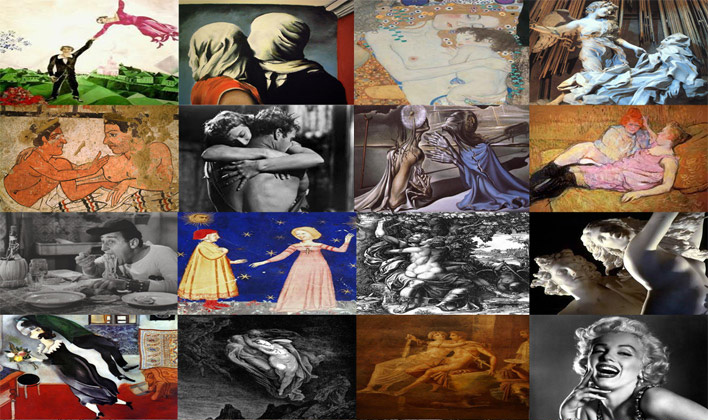The tyranny of the beginnings
Abstract
This article aims to investigate the apparent dialectic between the diegetic function and the commentative function in the works of Walter Siti and Michel Houellebecq. The main thesis of this analysis considers the first as contingent on the second function. It will be investigated the ways in which the two authors submit their quite similar worldviews to different narrative procedures.
The study starts from a few general points about some of the speech devices activated in fictional writing. The second step lies in an overview of the recurring practices in the two authors' works, coming to a conclusion on some textual evidences considering two works in which the occurrences discussed seem to plainly transpire: Extension du doumain de la luit and Autopsia dell’ossessione.
At the end of the analysis, it is possible to assume that Siti and Houellebecq achieve in fiction a significant settlement of the intermittence between conceptualizing phases and narrative phases.
Downloads
References
Bardolle, Olivier, La Littérature à vif (Le cas Houellebecq), Parigi, L’Esprit des péninsules, 2004.
Brogi, Daniela - Donnarumma, Raffaele - Giglioli, Daniele - Pedullà Gabriele, “Walter Siti, Troppi paradisi”, Allegoria, 55 (2006): 211-229.
Clément, Murielle Lucie, Houellebecq, Sperme et sang, Parigi, L’Harmattan, 2003.
Clément, Murielle Lucie - van Wesemael, Sabine (eds.), Michel Houellebecq à la Une, Amsterdam, Rodopi, 2011.
Contarini, Silvia, “Walter Siti: Scuola di nudo”, Narrativa, 16 (1999): 117-131.
Demonpion, Denis, Houellebecq non autorisé, enquète sur un phénomène , Parigi, Maren Sell Editeurs, 2005.
Genna, Giuseppe, “Intervista a Michel Houellebecq: La carta e il territorio”, Carmilla. Letteratura, immaginario e cultura d’opposizione, 3 dicembre 2013,
http://www.carmillaonline.com/2010/12/03/intervista-a-michel-houellebecq-la-carta-e-il-territorio/
Gigliucci, Roberto, “Il corpo come luogo mentale”, L’Indice, 21 (2004): 5
Houellebecq, Michel, Le particelle elementari, Milano, Bompiani, 1999.
Karimi, Kian-Harald, “Nous n'étions que des machines conscientes: Von der Unausweichlichkeit des Utopischen in Romanen Michel Houellebecqs“, Visionen des Urbanen: (Anti-)Utopische Stadtentwürfe in der französischen Wort- und Bildkunst, Ed. Kurt Hahn, Matthias Hausmann, Heidelberg (Winter), 2012: 205-229.
Madrignani, Carlo, “Scuola di nudo”, L’Indice, 12 (1995): 3.
Paduano, Guido, “Ogni educazione è uno stupro”, La Rivista dei libri, IV, 12 (1994): 18-20.
Patricola, Jean-François, Michel Houellebecq ou la provocation permanente, Parigi, Écritures, 2005.
Simonetti, Gianluigi, “Un realismo d’emergenza. Conversazione con Walter Siti”, Contemporanea, 1 (2003): 161-167.
Simonetti, Gianluigi, “Lezioni di inesistenza: Scuola di nudo di Walter Siti”, Nuova corrente, 42 (1995): 113-128.
Siti, Walter, Scuola di nudo, Torino, Einaudi, 1994.
Siti, Walter, “Il romanzo come autobiografia di fatti non accaduti”, Narrativa, 16 (1999): 109-115.
Siti, Walter, Un dolore normale, Torino, Einaudi, 1999.
Id., Il senso della lotta, Milano, Bompiani, 2000.
Id., Estensione del dominio della lotta, Milano, Bompiani, 2001.
Id., Lanzarote, Milano, Bompiani, 2002.
Id., Piattaforma, Milano, Bompiani, 2003.
Id., La magnifica merce, Torino, Einaudi, 2004.
Id., Contro il mondo, contro la vita, Milano, Bompiani, 2005.
Id., La possibilità di un’isola, Milano, Bompiani, 2005.
Id., Troppi paradisi, Torino, Einaudi, 2006.
Id., La ricerca della felicità, Milano, Bompiani, 2008.
Id., Il contagio, Milano, Mondadori, 2008.
Id., La carta e il territorio, Milano, Bompiani, 2010.
Id., Autopsia dell'ossessione, Milano, Mondadori, 2010.
Id., Resistere non serve a niente, Milano, Rizzoli, 2012.
Viard, Bruno, Les tiroirs de Michel Houellebecq, Parigi, PUF, 2013.
Copyright Notice
You are free to copy, distribute and transmit the work, and to adapt the work. You must attribute the work in the manner specified by the author or licensor (but not in any way that suggests that they endorse you or your use of the work).









